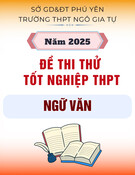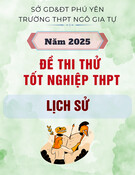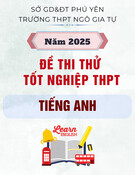BỘ GIÁO DỤC VÀ ĐÀO TẠO KỲ THI TRUNG HỌC PHỔ THÔNG QUỐC GIA NĂM 2017
Bài thi: NGOẠI NGỮ; Môn thi: TIẾNG ANH Thời gian làm bài: 60 phút, không kể thời gian phát đề ĐỀ THI CHÍNH THỨC (Đề thi có 06 trang)
Mã đề thi 404
Họ, tên thí sinh: ......................................................................... Số báo danh: .............................................................................
Mark the letter A, B, C, or D on your answer sheet to indicate the most suitable response to complete each of the following exchanges. Question 1. Anna and Ms White are meeting in a bookshop. Anna: "Good morning, Ms White. How are you?" Ms White: "Hi, Anna. ______. And you?"
A. I'm fine, thanks C. I'm not working today B. I'm forty years old D. I'm looking for a book
Question 2. Andrew is talking to a waiter in a restaurant. Andrew: "Can I have the bill, please?" Waiter: "______." A. You are very kind C. My pleasure B. Just a minute, please D. You're exactly right
Mark the letter A, B, C, or D on your answer sheet to indicate the word(s) CLOSEST in meaning to the underlined word(s) in each of the following questions. Question 3. They are going to declare details of the plan to the public later this week. D. notice
A. announce C. remind B. infer
Question 4. It rained so hard that the roads were quickly covered in water.
A. heavily B. lightly C. softly D. badly
Mark the letter A, B, C, or D on your answer sheet to indicate the word(s) OPPOSITE in meaning to the underlined word(s) in each of the following questions. Question 5. If you are at a loose end tomorrow, why don't we spend the day sunbathing and relaxing on the beach? A. having a lot to do C. having nothing to lose
B. having nothing to do D. having a lot to gain
Question 6. The twin girls are so identical that I can't distinguish one from the other.
A. similar B. alike C. different D. changeable
C. worked C. make D. opened D. dance B. face
Mark the letter A, B, C, or D on your answer sheet to indicate the word whose underlined part differs from the other three in pronunciation in each of the following questions. Question 7. A. washed B. passed Question 8. A. hate Mark the letter A, B, C, or D on your answer sheet to indicate the word that differs from the other three in the position of primary stress in each of the following questions. Question 9. A. medical B. essential Question 10. A. doctor B. student
C. dangerous C. advice D. regular D. parent
Trang 1/6 - Mã đề thi 404
Mark the letter A, B, C, or D on your answer sheet to indicate the correct answer to each of the following questions. Question 11. The dog ______ my father gave me is very lovely. B. when D. where C. which A. who
Question 12. There has been growing public concern about the use of chemicals in food ______ recently.
A. preservation B. protection C. reservation D. conservation
Question 13. Peter bought a ______ car as a present for his wife two weeks ago.
A. new German red B. red German new C. red new German D. new red German
Question 14. You ______ pass the exam in order to graduate from high school.
A. must B. can C. may D. might
Question 15. During a job interview, candidates are advised to ______ on the interviewer's questions and make an effort to answer them properly.
A. emphasize B. decide C. concentrate D. rely
Question 16. The higher the cost of living is, ______. A. the life of the immigrants becomes the harder B. the hardest the life of the immigrants becomes C. the harder does the life of the immigrants become D. the harder the life of the immigrants becomes
Question 17. Harmful environmental factors can ______ the development of certain diseases.
A. generate B. accelerate C. produce D. monitor
Question 18. Last week, we ______ an interesting film about the animal world.
A. see B. saw C. are seeing D. will see
Question 19. The pace of ______ life is much slower in the country than in the city.
A. an C. Ø B. a
D. the Question 20. The success of the company in such a ______ market is remarkable.
A. compete B. competitively C. competitive D. competition
Question 21. A lot of research in medical science has been ______ to improve human health.
A. made up B. carried out C. taken up D. given off
Question 22. It is important for students to ______ full use of university facilities.
A. take B. do C. find D. make
Read the following passage and mark the letter A, B, C, or D on your answer sheet to indicate the correct word or phrase that best fits each of the numbered blanks from 23 to 27.
Culture has a strong influence on non-verbal communication. Even the simple act of looking someone in the eye is not at all that simple. In the USA, Americans are (23)______ to look directly at people when speaking to them. It shows interest in what they are saying and is thought to carry a (24)______ of honesty. Meanwhile, in Japan and Korea, people avoid long periods of eye contact. It is considered more polite to look to the side during a conversation. The Lebanese, (25)______, stand close together and look intensely into each other's eyes. The action shows sincerity and gives people a better sense of what their counterparts want.
Given such differences with even the most common expressions, people (26)______ travel or work abroad have a real need to learn the other culture's body language. People tend to be unaware of the messages they are sending to others. So, it is (27)______ to consider your own body language before dealing with people from other cultures. Knowing about the body language of friends, clients, and colleagues can be very helpful in improving understanding and avoiding miscommunication.
(Source: Reading Fusion 1 by Andrew E. Bennett)
Trang 2/6 - Mã đề thi 404
B. forbidden B. sense B. moreover B. where B. use D. opposed D. touch D. in addition D. whose D. useful C. assisted C. taste C. therefore C. who C. usefulness
Question 23. A. encouraged Question 24. A. sound Question 25. A. in contrast Question 26. A. which Question 27. A. usefully Read the following passage and mark the letter A, B, C, or D on your answer sheet to indicate the correct answer to each of the questions from 28 to 34.
When naming a child, some parents seem to choose a name based simply on their personal preference. In other families, grandparents or professional name-makers come up with a child's name. In some cases, the time of a child's birth influences how the child's name is determined.
In many European cultures, names are typically chosen by parents. Parents' choice for their child's name may be based on names of their relatives or ancestors. For example, in Italy, children are traditionally named after their grandparents. The parents generally use the father's parents' names first. If they have more children, then they will use the mother's parents' names. Similarly, some people in Eastern Europe name their children after relatives who have died. This tradition is seen as a means to protect the child from the Angel of Death.
Traditionally in some Asian countries, a child's grandfather or a fortune-teller chooses the child's name. In contrast to the tradition of naming children after relatives, the child's name is chosen to influence the child's character. For example, names may be based on a connection to certain elements such as fire, water, earth, wood, or metal. Or the name might include a written character meaning beauty, strength, or kindness.
In certain African cultures, when a child is born plays a large part in determining the child's name. In Ghana's Akan culture, the day a child is born determines the child's name. But each day has different names for boys and girls. For instance, a boy born on Friday is named Kofi, whereas a girl born on the same day is named Afua. Both Kofi and Afua mean "wanderer" or "explorer." Children with these names are seen as travelers.
No matter where the name comes from, a child's name is the first gift in life. Whether the name is chosen according to preference or dictated by tradition, it reflects something about a child's culture. For that reason, all names should be treasured and respected.
(Source: Reading Challenge 2 by Casey Malarcher & Andrea Janzen)
Question 28. What is the main idea of the passage? A. The choice of name for a child in Asia B. The history of child naming around the world C. The practice of child naming in Europe D. The tradition of child naming in different cultures Question 29. According to the passage, in many European cultures, names are typically selected by ______.
A. ancestors B. parents C. relatives D. grandparents
Question 30. The word "means" in paragraph 2 is closest in meaning to ______.
A. sign B. symbol C. route D. way
Trang 3/6 - Mã đề thi 404
Question 31. What is a common belief in some Asian countries concerning the tradition of naming a child? A. A child's name must include a written character meaning beauty, strength, or kindness. B. The choice of a child's name is believed to have an impact on his or her personality. C. A child's name shouldn't be connected with certain elements of nature. D. The choice of a child's name should be based on names of his or her relatives. Question 32. Which of the following about the tradition of child naming in African countries is NOT true according to the passage? A. The arrival time of a child is an important factor in deciding his or her name. B. Children born on Friday are normally given names meaning traveling. C. Children receive the same name if they are born on the same day. D. No matter how a child's name is chosen, it is related to his or her culture. Question 33. The word "it" in paragraph 5 refers to ______. C. name A. preference D. tradition B. culture
Question 34. The word "treasured" in paragraph 5 is closest in meaning to ______.
A. ignored B. developed C. valued D. revealed
Read the following passage and mark the letter A, B, C, or D on your answer sheet to indicate the correct answer to each of the questions from 35 to 42.
Tropical rainforests are being destroyed and badly degraded at an unsustainable rate. Some scientists estimate that in the early 1990s tropical forests were being destroyed at a rate of approximately 28 hectares a minute, or about 14 million hectares each year – an area about the size of the state of Wisconsin. This figure marked a decrease since the 1980s, when approximately 16 million hectares were destroyed each year, largely due to a reported decline of deforestation in the Amazon River Basin in the early 1990s. However, satellite images indicate that rates may have rebounded in the late 1990s as burning in the Amazon increased again. Over the past three decades alone, about 5 million square kilometers – or 20 percent of the world's tropical forests – have been cleared. During this time, deforestation in tropical Asia reached almost 30 percent. High rates of deforestation are inevitably followed by alarming rates of plant and animal extinction because many rainforest species cannot survive outside their pristine rainforest habitat. Some scientists estimate that dozens of rainforest species are becoming extinct every day.
Causes of deforestation vary from location to location, but certain patterns tend to be consistent across all forests. Logging companies in search of valuable rainforest hardwoods, or, less often, oil companies in search of petroleum, are often the first to enter a remote area of rainforest. Some logged forests, if left alone, can regenerate in a few decades. But typically, they are not left alone – the roads built by logging companies often provide access for landless farmers to enter a new area, as well as a means to transport agricultural crops to market. For every 1 kilometer of new roads built through a forested area, 4 to 24 square kilometers are deforested and colonized.
Once the loggers leave the land, a typical cycle of destruction ensues. When the landless farmers arrive, they clear the land for planting. Poor rainforest soils produce a low crop yield, especially after a couple of years. At that point, the farmers often sell their lands to cattle ranchers or large plantation owners. After nutrients have been exhausted and soils compacted by cattle, lands are then abandoned and often laid to waste. Rainforest does not readily regenerate on these lands without human intervention. Meanwhile, the colonist farmers and cattle ranchers move to a new piece of land made accessible by logging roads, where the cycle of deforestation begins again.
(Source: Microsoft ® Encarta ® 2009. © 1993-2008 Microsoft Corporation)
Trang 4/6 - Mã đề thi 404
Question 35. What does the passage mainly discuss? A. The size of tropical rainforest loss B. Causes and effects of rainforest destruction C. The rate of rainforest destruction in the Amazon D. Typical patterns of extinction of rainforest species Question 36. According to paragraph 1, which of the following about the rate of rainforest destruction is TRUE? A. It was greater in the early 1990s than in the 1980s. B. It was the same in the early 1990s as in the 1980s. C. It was greater in the 1980s than in the early 1990s. D. It kept increasing from the 1980s to the 1990s. Question 37. The word "rebounded" in paragraph 1 could be best replaced by ______.
A. remained unchanged B. fallen again C. risen again D. gone up and down
Question 38. Which of the following can result from the loss of tropical rainforests? A. The decrease in wasted lands B. The disappearance of many rainforest species C. The disappearance of landless farmers D. The increase in the rainforest habitat Question 39. According to the passage, what is the most common cause of deforestation in different regions?
A. The search for oil C. The search for rare animals
B. The search for valuable woods D. The search for new farm lands Question 40. The word "regenerate" in paragraph 2 is closest in meaning to ______. D. refine A. recover C. repeat B. renew
Question 41. The phrase "these lands" in paragraph 3 refers to ______.
A. lands for raising cattle C. lands abandoned and wasted B. lands sold and colonized D. lands for planting
Question 42. What can be inferred about rainforests from the passage?
A. Rainforest destruction can be reduced with the help of cattle ranchers. B. The cycle of rainforest destruction will come to an end. C. Human beings are the main contributor to deforestation in tropical regions. D. Most tropical rainforests have been sold to plantation owners.
A B D
A D C
B
Mark the letter A, B, C, or D on your answer sheet to indicate the underlined part that needs correction in each of the following questions. Question 43. Working as a doctor would give me a chance taking care of people's health. C Question 44. Jane help her mother to do the housework when she has free time. B Question 45. Many living organisms depend largely on the environment for the satisfaction of its A C D needs.
Trang 5/6 - Mã đề thi 404
Mark the letter A, B, C, or D on your answer sheet to indicate the sentence that is closest in meaning to each of the following questions. Question 46. They cancelled all the sporting events because of the heavy rain. A. Without the heavy rain, they wouldn't cancel all the sporting events. B. If it hadn't rained heavily, they would have cancelled all the sporting events. C. If it didn't rain heavily, they wouldn't cancel all the sporting events. D. Had it not rained heavily, they wouldn't have cancelled all the sporting events. Question 47. I haven't heard from Susan for several months. A. I last heard from Susan several months ago. B. Susan didn't hear from me several months ago. C. Susan heard from me several months ago. D. I didn't hear from Susan several months ago. Question 48. "I didn't give John the money," said Mary. A. Mary denied giving John the money. B. Mary admitted giving John the money. C. Mary suggested giving John the money. D. Mary remembered giving John the money. Mark the letter A, B, C, or D on your answer sheet to indicate the sentence that best combines each pair of sentences in the following questions. Question 49. Many Vietnamese women are successful in their careers. They are excellent homemakers. A. Many Vietnamese women are successful in their careers, and they are excellent homemakers. B. Many Vietnamese women are successful in their careers, for they are excellent homemakers. C. Many Vietnamese women are successful in their careers, so they are excellent homemakers. D. Many Vietnamese women are successful in their careers, or they are excellent homemakers. Question 50. Nam had all the necessary qualifications. They didn't offer him the job. A. Despite having all the necessary qualifications, Nam was not offered the job. B. They didn't offer Nam the job as he had all the necessary qualifications. C. Nam had all the necessary qualifications, so they didn't offer him the job. D. If Nam had had all the necessary qualifications, he would have been offered the job.
------------------------ THE END ------------------------
Trang 6/6 - Mã đề thi 404

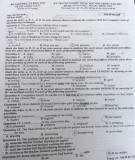
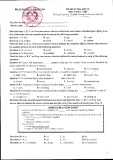
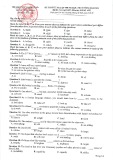
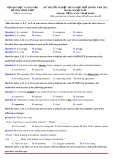
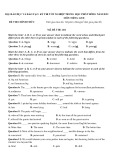
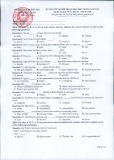
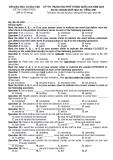
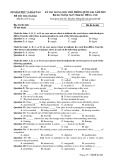
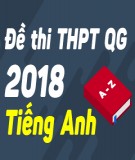
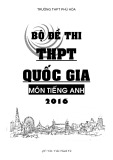


![Đề thi tiếng Anh tốt nghiệp THPT 2025 (Chính thức) kèm đáp án [mới nhất]](https://cdn.tailieu.vn/images/document/thumbnail/2025/20250627/laphong0906/135x160/9121751018473.jpg)

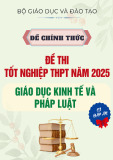
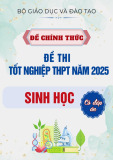


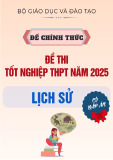
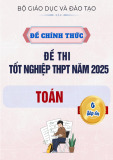

![11 chủ đề ôn tập môn Toán lớp 2 [chuẩn nhất]](https://cdn.tailieu.vn/images/document/thumbnail/2025/20250613/phuongnguyen2005/135x160/74791749803387.jpg)
